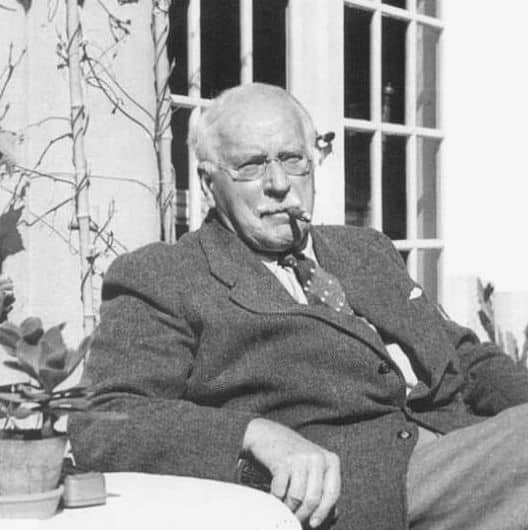
For millenia dreams interpretation has been a subject of fascination and mystery, with various hypothesis and theories attempting to unravel their enigmatic nature.
Sigmund Freud, a pioneer in psychoanalysis, assumed that dreams emerge from the amalgamation of recent events and childhood memories. Freud saw dreams as the “wish fulfilment” vehicle and the guardians of sleep.
However, it was Carl Gustav Jung who suggested that dreams don’t only reflect personal experiences. He saw dreaming as a space where our individual’s existence gets connected with the evolutionary past of our species.
In this article we shade light on C.G. Jung’s psychology and dream analysis and its implications for modern psychology.
Jungian Dream Analysis in Light of Current Research
C.G. Jung’s concept of dreams accessing an ancient stratum of human experience was initially met with scepticism. However, in the past decades Jungian dreams analysis has been supported by growing evidence based scientific research.
One of the most important was the discovery REM sleep by Eugene Aserinsky and Nathaniel Kleitman. The show the correlation between dreaming and REM sleep. However, it was the French neuroscientist, Michel Jouvet, who mapped out the brain structures that generate REM sleep. He compared the discovery to finding “a new continent in the brain”.
Dreams and Survival Strategies
Jouvet differed from other scientists who believed that REM sleep and dreams are just a tool for consolidating memories. He found that dreams emerge from an inherited biological basis. Jouvet saw dreams as a space for updating survival tactics by using the inherited patterns of behaviour. By reevaluating current experiences in light of past strategies, animals and humans optimize their chances of adaptation and survival. This process occurs during sleep when the brain is liberated from external distractions, aligning with insights from C.G. Jung dream analysis and the C.G. Jung meaning of dreams.
In essence, dreaming facilitates the synchronization of personal and ancestral experiences, enhancing an individual’s ability to navigate life’s challenges. This notion resonates with Carl Jung dream interpretation, where symbols guide growth, and the meaning of dreams in C.G. Jung psychology, which links personal experiences with universal archetypes through the collective unconscious.
Freudian versus Jungian Dream Analysis
Contrary to Freud’s view of dreams as guardians of sleep or manifestations of repressed desires (dreams as wish-fulfilment), Jung and Jouvet proposed a more nuanced understanding. They viewed dreams as spontaneous expressions of the central nervous system, transcending individual experiences to tap into universal patterns. These archetypal expressions, as Jung termed them, give rise to symbols that resonate across cultures and epochs.
Freud acknowledged the presence of universal symbols in dreams but attributed them primarily to sexual impulses – a perspective Jung found limiting and overly dogmatic. However, with the accumulation of vast amounts of dream data from diverse cultures worldwide, Jung’s hypothesis gained credibility.
Dreams from Biological Standpoint
From a biological standpoint, dreams are akin to genetic blueprints, preparing organisms for life’s challenges. Alfred Adler‘s assertion that “dreams are dress rehearsals for life” finds resonance in contemporary ethology, where dreams are deemed essential for organizing the behavioral repertoire crucial for survival.
Moreover, the biological significance of dreams becomes apparent as warnings of potential threats. Dreams shape the instinctive responds to dangerous situation drawing upon ancestral knowledge encoded within the collective unconscious. Similarly, the role of dreams in priming sexual experiences underscores their fundamental role in maintaining innate behaviours.
Dreams and Archetypal Theory
The implications of archetypal theory extend beyond dream analysis to contemporary psychiatry. Understanding the archetypal nature of dream symbols, and themes offers valuable insights into the human psyche, acknowledging the profound connections between individual experiences and broader human narratives.
Dreams serve as a direct line of communication between our modern selves and the primal instincts of our ancestors. In our dreams, we venture into the Palaeolithic caves of our forebears, updating their experiences with our contemporary context.
Dream Symbols and Themes
Statistical analyses of dream content reveal recurring themes deeply rooted in our phylogenetic past. Themes such as falling, being pursued, or engaging in repeated tasks evoke ancestral experiences of survival, and adaptation. The contemporary research highlights in dreams the prevalence of archetypal symbols and themes. Such symbols and themes are present across cultures and individuals, underscoring the universality of human concerns.
Jung’s concept of the collective unconscious as a storage of accumulated human experience elucidates the evolutionary stratification of the psyche. Jungian dream analysis posits that during the sleep we tap into the collective unconscious expressing instinctual drives and ancestral memories. In Jung’s view dreams serve as conduits for assimilating unconscious contents, helping to solve individual’s challenges by using the inherited knowledge of the species.
In Jungian dreams analysis dreams and their universal symbols are not mere figments of imagination but profound expressions of our evolutionary heritage and innate instincts. They bridge the gap between past and present, offering glimpses into the timeless wisdom encoded within the human psyche.
Reconnecting with Archetypal World
What would our ancestors make of our world today? While they might appreciate modern conveniences, they likely yearn for the communal bonds and symbiotic relationship with nature that defined their existence. The loss of close-knit communities, shared responsibilities, and mythic storytelling leaves a void in our lives, leading to archetypal frustration, feelings of disconnection form our ancient roots and as its effect to illness.
The contrast between their world and ours can be overwhelming, causing psychological distress. Exploring this theme further reveals the profound impact of societal changes on our mental well-being. By reconnecting with the archetypal world of our dreams and honouring the wisdom of our ancestors, we may find solace and healing in navigating the complexities of modern life. In the intricate tapestry of human existence, dreams serve as pivotal threads, weaving together the primal instincts and evolutionary heritage that shape our behaviour and psyche.
Read More about Jungian Psychology
- Carl Gustav Jung. A Short Biography
- Psychology of Carl Gustav Jung
- The Collective Unconcious
- The Self
- The Individuation
- The Archetyps
- Archetyps. The Redicovered Theory
- The Ego and The Persona
- The Shadow
- The Animus and The Anima
- The Archytypal Neurosis
- Jungian Psychology and the Brain Structure
- Brain Evolution and Psychology
- Synchronicity
- Freudian and Jungian Models of the Psyche
- C.G. Jung and Otto Gross
- C.G. Jung Psychological Types
- C.G. Jung’s Word Association Test
- The Spiritual Aspect of the Psyche (Jungian View)

DR. GREGOR KOWAL
Dr. Gregor Kowal studied human medicine at the Ruprecht-Karls-University in Heidelberg, Germany, where he also earned his doctoral degree (PhD). He completed his specialization in Psychiatry and Psychotherapy with the Medical Chamber of Koblenz, Germany. In the following years, he held positions as Head of Department and Medical Director in various psychiatric hospitals across Germany. Alongside his clinical responsibilities, he served as a consultant expert for the Federal Court in Frankfurt, providing psychiatric evaluations in legal cases. Since 2011, Dr. Kowal has been working as the Medical Director of CHMC, the Clinic for Psychiatry and Psychotherapy in Dubai, UAE. His specialist training includes extensive expertise in biological psychiatry and psychodynamic psychotherapy.


